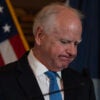Where can Congress’ “super committee” find its $1.2-trillion target in savings?
The answer is hidden in plain sight. The money could come from Obamacare, to avoid implementing its huge expenses. Repealing the health care law would solve the super committee’s dilemma, yielding more than enough savings to fulfill their mission.
Yet Obamacare has been placed “off-limits” for no good reason.
“Anyone tracking the super committee has heard the mantra: Everything is on the table. But there’s one big item that doesn’t appear to be on that gigantic deficit-cutting table: President Barack Obama’s health reform law, his signature domestic achievement.”
By itself, repeal of Obamacare would more than fulfill the mission assigned to the super committee. If we didn’t have the expense of Obamacare, it would save more than the $1.2-trillion in savings they are supposed to find over the next 10 years.
But in most quarters, the silence about repeal is deafening. Not so, though, for Rep. Denny Rehberg (R-MT), who is making a determined but overlooked effort through his HR 3243, “The Common Sense Deficit Reduction Act.”
Rehberg goes after the costliest parts of Obamacare now, before they kick in and Americans become dependent upon them. They include taking out the expansions of Medicaid and the health insurance premium subsidies that are projected to cost $1.379-trillion over the next 10 years. As analysts Nina Owcharenko and Jim Capretta note in their paper, “The reality is that the new health care law will result in trillions in unaffordable deficit spending.
The Congressman points out that Obamacare’s brand-new entitlement programs are not yet operative, so nobody’s current benefits would be lost or reduced. Cutting out those Obamacare programs would also avoid the defense cuts and Medicare cuts that otherwise would occur (under sequestration law) if the super committee fails to find $1.2-trillion somewhere else.
Rehberg knows the damage ahead if Obamacare stands; he chairs the Labor, Health and Human Services, and Education Subcommittee of the House Appropriations Committee. HR 3243 is silent on all others aspect of Obamacare save the massive spending expansions, so issues like the individual mandate remain would untouched until after the Supreme Court rules on its constitutionality.
The bottom line is that Rehberg’s proposal points out a key fact that most politicians are ignoring: The simplest way to meet the super committee’s $1.2-trillion goal is to stop new spending before it happens, by undoing Obamacare’s subsidies and Medicaid expansion.
After that, we should get all of Congress—not just the super committee–focused on reforming entitlements and cutting spending, but not raising taxes.































2 Replies to “Where Can Congress Find Room to Cut? Look to Obamacare.”